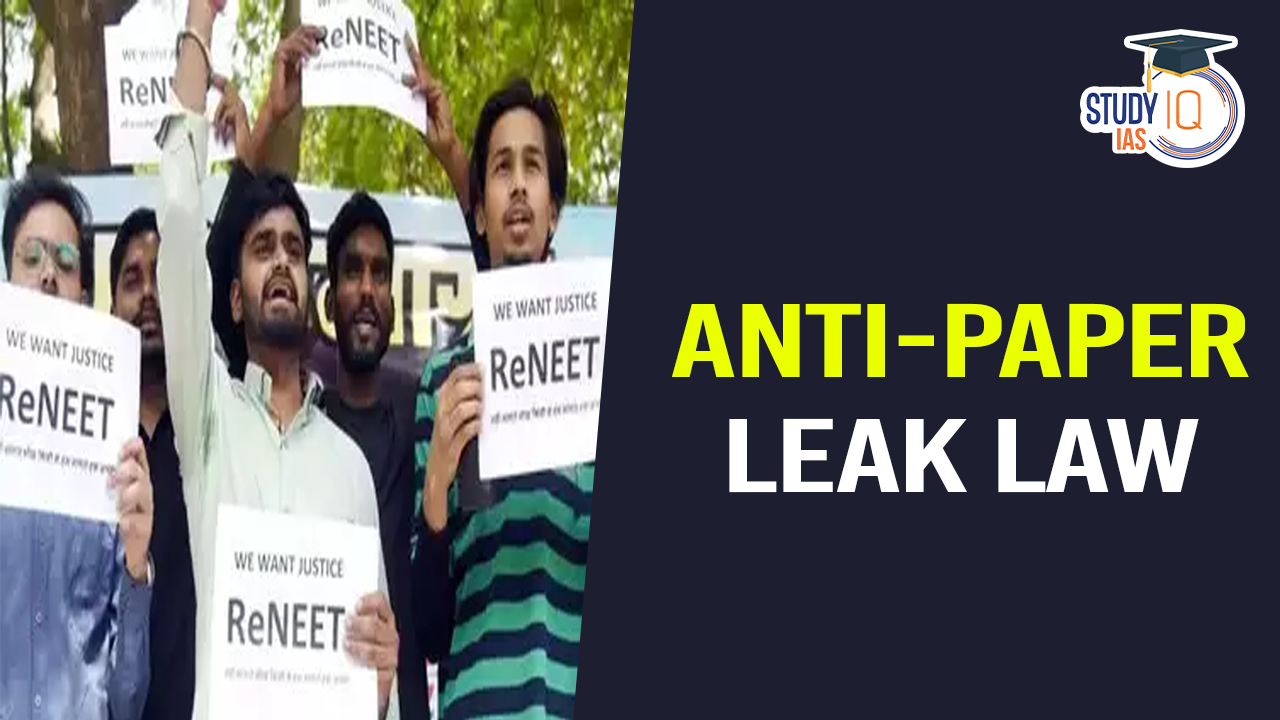Table of Contents
On June 21, 2024, the Public Examinations (Prevention of Unfair Means) Act, 2024, came into effect, marking a significant milestone in India’s efforts to combat exam malpractices. Check Out Anti-paper Leak Law, Need, Key Provision and Implementation in this article.
Anti-paper Leak Law
The Public Examinations (Prevention of Unfair Means) Act, 2024, effective June 21, aims to curb exam malpractices in India. It introduces stringent penalties, including 3-5 years of imprisonment and fines up to Rs 10 lakh for individuals involved in cheating, and 5-10 years and a minimum fine of Rs 1 crore for organized fraud. The law targets exam rigging for UPSC, SSC, RRB, IBPS, JEE, NEET, and CUET, ensuring integrity and fairness.
Need for Anti-paper Leak Law
The introduction of this law comes amid increasing concerns over the integrity of public examinations in India. Recent incidents, such as the controversy over NEET-UG results and the cancellation of the UGC-NET exam due to paper leaks, have highlighted the vulnerability of these exams to malpractice. These issues not only compromise the fairness of the selection process but also jeopardize the futures of bona fide students who rely on these exams for their educational and career prospects.
Key Provisions of Anti-paper Leak Law
The Public Examinations (Prevention of Unfair Means) Act, 2024, outlines stringent measures to deter and penalize exam fraud. Key provisions include:
- Punitive Measures: The law prescribes a jail term of 3-5 years and a fine of up to Rs 10 lakh for individuals caught impersonating a candidate, engaging in paper solving, or failing to report exam fraud. More severe penalties are in place for those involved in organized cheating and malpractices, with 5-10 years of imprisonment and a minimum fine of Rs 1 crore.
- Crackdown on Organized Crime: The law targets organized groups and institutions involved in paper leaks, paper solving, impersonation, and hacking of computer resources. These crimes often occur in collusion with insiders for monetary or wrongful gains.
- Protection for Bona Fide Students: Importantly, the law exempts genuine students from liability in cases where their future is compromised due to undetected leaks, exam cancellations, or delayed results.
- Institutional Accountability: Service providers and institutions found guilty of rigging public exams will be required to bear the proportionate cost of the examination, ensuring that they are held financially accountable for their actions.
Anti-paper Leak Law: Implementation and Impact
The Act empowers the central government to appoint specific dates for its provisions to come into force, with June 21, 2024, marked as the effective date by a gazette notification from the Ministry of Personnel, Public Grievances, and Pensions. The implementation of this law is expected to significantly enhance the integrity and reliability of public examinations in India.
Reactions and Implications
The introduction of this law has been met with mixed reactions. Many educators, students, and policymakers have praised it as a necessary step to uphold the sanctity of India’s examination system. They believe that stringent penalties and comprehensive measures will deter potential fraudsters and protect the interests of honest students.
However, there are also concerns about the law’s implementation and its potential to be misused. Critics argue that the law should ensure due process and safeguards to prevent wrongful accusations and to protect the rights of students and institutions.
Anti-paper Leak Law UPSC
The Public Examinations (Prevention of Unfair Means) Act, 2024, represents a robust framework to combat the menace of exam malpractices in India. By imposing strict penalties and holding institutions accountable, the law aims to restore faith in the examination system. As it takes effect, the success of this legislation will depend on its fair and effective implementation, ensuring that it serves its intended purpose of promoting integrity and fairness in public examinations.


 Phenome India Project: Mapping India's H...
Phenome India Project: Mapping India's H...
 UDAN Scheme, Objectives, Funding and Ach...
UDAN Scheme, Objectives, Funding and Ach...
 Indus Water Treaty 1960 Suspended by Ind...
Indus Water Treaty 1960 Suspended by Ind...





















